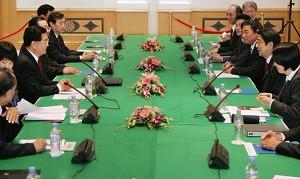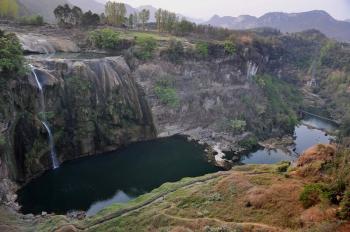After Japan Prime Minister Abe Shinzo’s visit to China in October, a second summit meeting was held during the APEC conference in Vietnam on November 18. To the surprise of Japan, the Chinese delegates did not include on the agenda any of the historical problems such as Yasukuni Shrine. During the second meeting, Hu Jintao indicated his wish to visit Japan.
For the past five years, the relationship between the Chinese Communist Party (CCP) and Japan has deteriorated to the freezing point, where there is no contact between any high level officials from each of these countries. The CCP repeatedly stated that the visits to Yasukuni Shrine by former Japanese Prime Minister Junichino Koizumi adversely affected the relations between the two countries. Abe’s visit to Beijing in October was considered to be the “Ice-breaking Tour”. The CCP not only welcomed Abe, but also offered concessions in an attempt to remedy their major problems, such as Yasukuni Shrine and Taiwan.
Abe Shinzo was a former cabinet member under the government of former Prime Minister Koizumi Junichino. Abe supported Koizumi’s visit to the Yasukuni Shrine while also visiting the shrine himself. Since he took the office of prime minister, he has not announced his views or his intentions as to whether he will make an official visit to Yasukuni Shrine.
Japanese newspaper Sankei Shimbun reports that although the extensive agenda for the second meeting in Hanoi included many topics for discussion, such as the oil field in the East Sea, economics, nuclear weapons, North Korea, etc, it did not include sensitive topics like the Yasukuni Shrine and Taiwan. The report gave the opinion that this further confirmed Yasukuni Shrine as a diplomatic strategy used for political purposes by the CCP.
After the first meeting in October a China-Japan Joint Communiqué was issued and it did not mention Yasukuni Shrine or the fate of Taiwan.
After the recent APEC meeting with Japan and China, a signed commentary article in the Asia Times expressed strong dissatisfaction by pointing out that Abe did not make any substantial concessions, or any commitment not to visit Yasukuni Shrine.
In an interview with The Epoch Times, the chairman of the Overseas Chinese Democratic Coalition Wei Jingsheng indicated that several politicians and media observers believe the concession that the communist regime made was in reality a trap.
Wei states: The CCP needs a weak Japan for war with Taiwan
Wei said that, “Abe Shinzo is very right-wing in politics, the outside world thought he might go further than Junichino Koizumi did, and this was not what the CCP wanted. The CCP hopes Japan will be the kind of country that takes a ‘weak stance’ and to not continue with the ‘U.S.-Japan Alliance.’”
“The CCP’s superficial concessions are actually a trap. If Abe Shinzo implemented a more right-wing policy, the CCP would then blame Abe Shinzo for the breakdown of the China-Japan relations. This would introduce tremendous pressure on Abe Shinzo because Japanese businesses may assert more pressure on him,” Wei added.
Wei visited Japan not long ago. In his public speeches, he stated the CCP’s internal conflicts is very intense now and that the Chinese people have lost trust in the CCP. Under this intense pressure the regime is paranoid more than ever and has sped up military preparations to defend its rule at all costs.
According to Wei, the CCP needs a war to shift the domestic crisis. He believes there are three necessary preliminary conditions for the CCP to begin its attack on Taiwan: one, it requires Russian support; two, that the NATO allied countries go against the U.S.; and three, a weak Japan.
Japan plays a key role in the Korean Peninsula and Taiwan Strait situation because of geographic, economic and political factors. The U.S. has clearly strengthened military cooperation with Japan in recent years, and listed Taiwan under the protection of the “Treaty of Mutual Cooperation and Security between the United States and Japan.” In Taiwan, President Chen Shui-bian’s recent speech also advocated a Japanese version of the “Taiwan Relations Act,” and appealed for a U.S.-Japan-Taiwan security mechanism to safeguard Taiwan from the Chinese communist regime.




